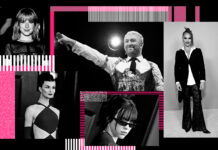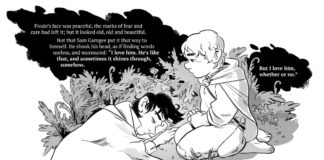
Drew Tarver’s room at the Bowery Hotel was bright. It was comfortable. It overlooked a cemetery, but not in a creepy way. When Tarver arrived, jet-lagged and rain-soaked after a late flight from Los Angeles, he found a Bowery-branded teddy bear on the bed and a bottle of red wine on the cafe table, compliments of the manager.
The next morning, the actress Heléne Yorke, 36, took the elevator to his room. As Tarver hid his retainer case, Yorke read the manager’s note, which addressed him as Mr. Tarver. “Who do they think you are?” Yorke teased.
Tarver, 35, is a star of the dark comedy “The Other Two,” which began its life on Comedy Central but returns for Season 2 on HBO Max, starting Thursday. He plays Cary Dubek, a gay aspiring actor. Yorke plays his sister, Brooke, a former dancer. Harassed by survival jobs, man troubles and housing crises, they lead lives of loud desperation until their much younger brother, Chase (Case Walker), becomes a tween sensation — or, as one newscaster puts it, “the next big white kid.”
During the first season, Brooke and Cary ride Chase’s designer coattails, clumsily. In the second, each has achieved some success. Drew now presents a red carpet segment called “Age Net Worth Feet.” Brooke manages Chase and their mother, Pat (Molly Shannon), who has become a talk-show host.
In some ways, this limited celebrity parallels Tarver’s and Yorke’s own lives. After years of appearing in niche fare, they are finally fame-adjacent. “We’re still not famous,” Yorke said. She looked out of Tarver’s window. The rooms next to his, she noticed, were nicer. They had little balconies.
“Turns out my bottle of wine isn’t so great after all,” Tarver said.
Even as “The Other Two,” created by the former “Saturday Night Live” writers Chris Kelly and Sarah Schneider, is a rapier-sharp satire of the entertainment industry, it also presents an unusually warm and functional relationship between Cary and Brooke, undergirded by a real affection that the actors seem to share. (Or maybe they’re just very good actors?)
During an hourlong conversation in the lobby (Henri, the failed hurricane, had scotched a planned mini-golf outing), the two discussed the show, their poor pandemic choices and their hopes for their characters. These are edited excerpts from the conversation.
Who was cast first?
YORKE Drew was cast before me. In true sexist fashion. Drew is also No. 1 on the call sheet, two years running, which is devastating for me as a woman.
TARVER I have constantly said we need to make her No. 1. No one listens to me.
YORKE Drew knew Chris from the improv and sketch comedy scene. I was not a part of that world at all. I got called back to read with Drew. They were like, “Feel free to do a little improv.” And I was sweating through my clothes.
TARVER In her audition, it just felt like siblings.
YORKE In showbiz, if you’re a duo, it’s not always roses. But it genuinely is for us. We just have fun all day.
But who’s the better actor?
TARVER Heléne
YORKE [Simultaneously:] Drew. Everything Drew does is so true. This is a person who is very funny and very off the cuff but also has a deep connection to what’s important. [To Tarver:] Now is when you talk about me.
TARVER She just comes in and kills it.
So you always related to these characters? You never saw them as monsters?
YORKE I saw myself in them. Being in your late 20s, early 30s, watching other people surpass you, it’s really disorienting. It gives you this hunger and this thirst that is all-encompassing. That’s what happens to Brooke and Cary. That’s what you watch them go through. I remember riding the subway and looking at people on commutes to real jobs, being like, they have health insurance and a full collection of pots and pans. That was so beyond me.
TARVER You were riding the subway with just that one egg pan.
YORKE It was all I had to make breakfast! But I have a lot of sympathy for Brooke and Cary. Anything they do that is bad or crazy is out of that hunger.
In the second season, they’re tasting success. Does it change them?
TARVER It’s surprising how little it does for them. They’re realizing, like: “Oh, I would have killed for this last year. But now I have it. Why didn’t that fix me? Why am I already used to it?”
YORKE It’s devastating to realize that you are still who you are. Success is not a magic wand. You think, “Oh, I’ll get success and all of a sudden, I’ll be this better person who’s happier and more settled in my life.” You get it, and all of your [expletive] comes with you.
TARVER The third season is just them real-time in therapy.
YORKE It’s “In Treatment.”
You had begun the second season when the shutdown hit. How did you spend the year off?
YORKE I became a five-star chef. And I started writing. I was saying yes to new experiences. I was like, I’m going to try skiing. I learned how to ski on YouTube, and I tore my ACL two weeks before going back to this job. So, yeah: cooking and being stupid.
And what were your injuries, Drew?
TARVER I lost both my feet. No. My two sisters live in L.A. We all packed up and went back to Georgia. I also got on YouTube. My grandma had this old Airstream trailer, all grown over with weeds, with raccoons living in it. Me and my little brother started watching YouTube videos where people get Airstreams and restore them. It’s always like, “Hey, I’m Mike.” “And I’m Diane. And we bought an Airstream.” Then the next video is like, “We’re cleaning out the Airstream, we’re throwing everything away.” The third video is like, “We’re done with this and we’re getting a divorce.”
YORKE He grew his hair out so long and a full Georgia trash beard. There are pictures, a time-lapse of him shaving it into mutton chops.
TARVER I shaved it a day before we started filming. It was shocking seeing my mouth again. I wasn’t convinced it worked right. The first morning I came in, I was like: “Hey, real quick, before we get out there, does this look like me? Am I my smiling right?”
YORKE We came back in real rough shape.
But you won. You made it onto a show that people actually watch. Are there downsides?
TARVER Sometimes it feels a little scarier. When you’re coming up, you’re just fearless with your choices because you’re just like, yes, anything. Then when you have a job, you have something to lose. Fear sets in.
YORKE This thing that never goes away — and it’s so sick — is that every good thing will be the last thing. So if it comes to an end, nobody will ask me to do anything.
It must be nice having a low-key kind of fame, though. People recognize you, but you don’t have to flee the paparazzi.
TARVER I mean, I do that. Even if it’s just one person, I will push them over and flee.
If this show has more seasons, what do you want for these characters?
YORKE I hope that the situations become even fancier.
TARVER I want to see them continue to struggle. But in palaces.
YORKE It’s so easy to say you want them to figure it out. But I don’t want them to because I’m comforted by the fact that they don’t. It makes me feel less alone.
TARVER It does feel nice to come to work and play a bumbling person. Because it’s like, OK, yeah, this feels real.
YORKE We want them to always feel lost and bad. That’s what’s universal.








